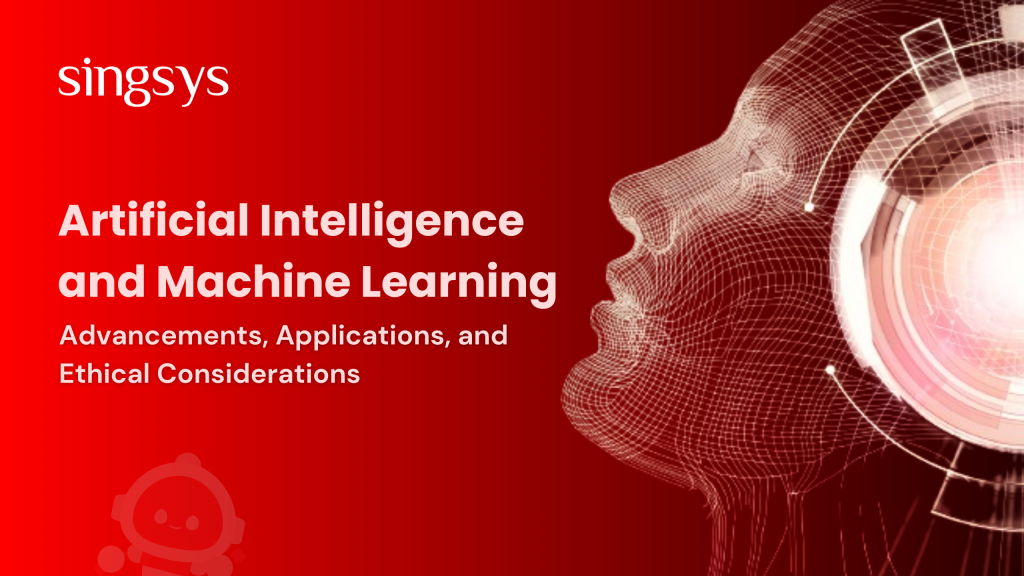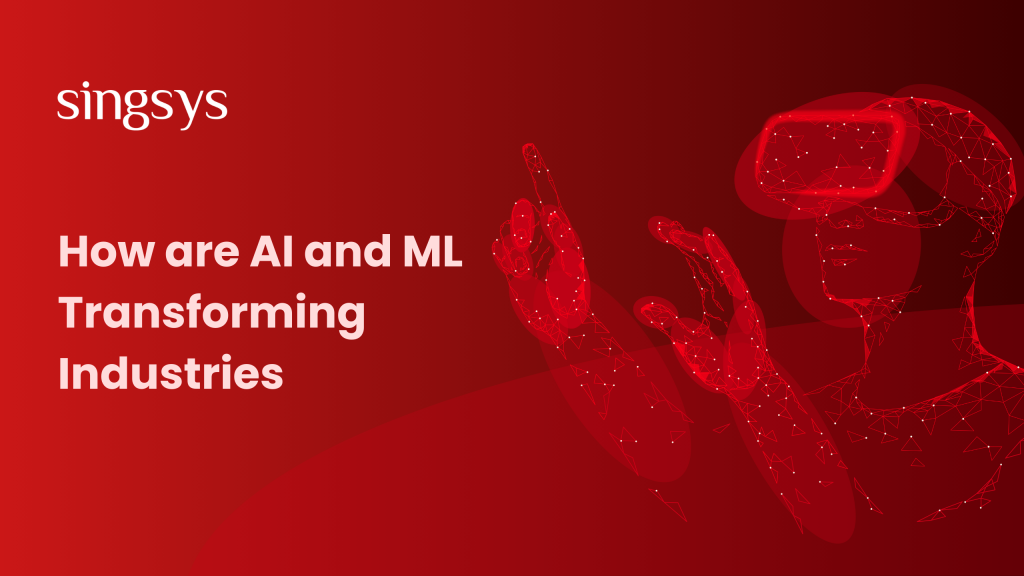The Top 10 Tech Trends IT Companies Can’t Ignore in 2025
Stay ahead of the curve with our comprehensive guide to the top 10 tech trends IT companies need to pay attention to in 2024.

Have you ever found yourself curious about the inner workings of your phone’s ability to predict your next word as you type, or the intricate algorithms used by traffic lights to dynamically adapt to traffic flow? The explanation for these phenomena lies within the complex and fascinating fields of Artificial Intelligence (AI) and Machine Learning (ML).
Artificial Intelligence (AI) is a part of computer science that focuses on creating smart machines capable of imitating human thought processes such as learning and problem-solving. Imagine a machine that can do complex calculations and also learn from information, adjust to new situations, and even think about the world around it. That’s the essence of Artificial Intelligence.
Machine Learning (ML) is a part of AI that helps machines improve their performance on a specific task without being explicitly programmed. Unlike traditional software that relies on a set of predefined instructions, ML algorithms can learn from data and find patterns. Their proficiency increases with the amount of data they process. It’s like a student getting better at solving math problems the more they practice – that’s the core idea behind ML algorithms.
The history of AI and ML is a fascinating story of human innovation that dates back several decades. Early visionaries such as Alan Turing established the theoretical foundation for AI in the 1940s. Over the following years, the field made significant strides with the development of expert systems, symbolic reasoning, and neural networks. However, there were limitations in computing power and algorithms that needed improvement.
In recent years, the resurgence of AI and ML has been fueled by the emergence of big data and advancements in computing power, especially the development of powerful graphics processing units (GPUs). Deep learning, a subfield of ML inspired by the structure and function of the human brain, has been pivotal in this revolution, leading to breakthroughs in areas such as computer vision, natural language processing, and robotics.
Artificial Intelligence (AI) and Machine Learning (ML) have come a long way in making our technology smarter and more helpful. Let’s take a look at how they’ve improved over time:
AI and ML have changed a lot since they were first introduced. They started with simple rules and instructions but have now become much more advanced. Now, we have things like deep learning, which helps computers learn from huge amounts of data. This has made AI and ML much better at understanding language, recognising images, and making decisions.
There have been some really big moments in the history of AI and ML. One of them was when IBM’s Deep Blue computer beat the world chess champion, Garry Kasparov, in 1997. This showed that computers could outsmart even the best human players. Another milestone was when AlphaGo, a program developed by Google, defeated human champions in the game of Go in 2016. These events proved just how powerful AI and ML can be at solving complex problems.
The improvements in AI and ML have made a huge difference in many different industries. In healthcare, for example, these technologies are helping doctors make more accurate diagnoses and find better treatments for patients. In finance, AI is being used to make smarter investment decisions and detect fraud more effectively. Even in transportation, AI is making things like self-driving cars safer and more efficient.
These days, AI and machine learning are not just concepts from science fiction. They’re transforming healthcare, banking, and even transportation in the real world. Now let’s explore a few of the exciting uses of:

Healthcare is seeing significant changes due to artificial intelligence (AI). It’s helping doctors and nurses in many ways, like diagnosing diseases, finding treatments, and even predicting patient outcomes. With AI, healthcare professionals can analyse large amounts of medical data quickly and accurately, leading to better care for patients. For example, AI algorithms can spot patterns in medical images like X-rays and MRIs, helping doctors detect diseases like cancer earlier. AI is also used in personalised medicine, where treatments are tailored to each patient’s unique characteristics, improving their chances of recovery.
Artificial Intelligence (AI) has revolutionised e-commerce. It offers personalised product recommendations, round-the-clock customer support through chatbots, and efficient inventory management with predictive analytics. Visual search technology simplifies product discovery, while dynamic pricing strategies ensure competitiveness. AI also enhances security through fraud detection and optimises supply chain operations for timely delivery, reshaping the e-commerce industry.
AI is changing the finance world, empowering investors and financial institutions with advanced analytics to make informed decisions and manage money more effectively. AI analyses vast financial datasets to predict stock prices, market trends, and risk, providing valuable insights for strategic investment decisions. By identifying patterns in market data that humans might overlook, AI enables traders to capitalise on profitable opportunities and mitigate potential risks.
Moreover, AI plays a crucial role in cyber security in finance by enhancing fraud detection capabilities, detecting anomalous patterns in financial transactions, and flagging suspicious activities for further investigation. With AI’s assistance, the finance sector can stay ahead of emerging threats and safeguard financial assets more effectively.
Autonomous vehicles, or self-driving cars, are an exciting application of AI and machine learning. These vehicles use AI algorithms to understand their surroundings, make decisions, and travel safely without human intervention. AI helps autonomous vehicles identify obstacles, pedestrians, and other vehicles on the road, allowing them to drive safely and avoid accidents. AI also assists in finding the best routes for efficiency and reducing traffic congestion. With advancements in AI technology, autonomous vehicles have the potential to transform transportation by making it safer, more convenient, and more sustainable.
When we talk about AI and ML, we also need to think about being fair and doing the right thing. Here are some things to consider:
Here are some challenges we need to overcome and where AI is headed in the future:
As we continue to make strides in the development of artificial intelligence (AI) and machine learning (ML), it’s crucial to place a strong emphasis on ethical considerations. We must work together collaboratively to guarantee that AI systems are not only fair and respectful of privacy standards but also make a positive contribution to society. By wholeheartedly embracing these principles, we can pave the way for a future in which AI technologies are harnessed to serve the greater good.
Ans: We can start by being transparent about how AI works and making sure it treats everyone fairly.
Ans: AI might change some jobs, but it could also create new ones. We need to think about how to prepare for these changes.
Ans: We can use things like encryption and data anonymisation to keep people’s personal information safe.
Ans: Everyone involved in AI development, from researchers to companies to policymakers, has a role to play in ensuring ethical AI usage.
Ans: You can raise your concerns with the people or organisations responsible for the AI system and advocate for changes to make it more ethical.
Jun 4th, 2024
Stay ahead of the curve with our comprehensive guide to the top 10 tech trends IT companies need to pay attention to in 2024.
May 2nd, 2024
Will you be ready for the software development landscape in 2024? Expert insights on the top 15 trends – from VR collaboration to quantum computing – that will shape the future in this forward-looking Developer’s Roadmap.
Oct 13th, 2023
The cryptocurrency market has witnessed explosive growth in recent years, and with it, the demand for robust and reliable crypto exchange platforms has soared. Behind the scenes, software development companies […]